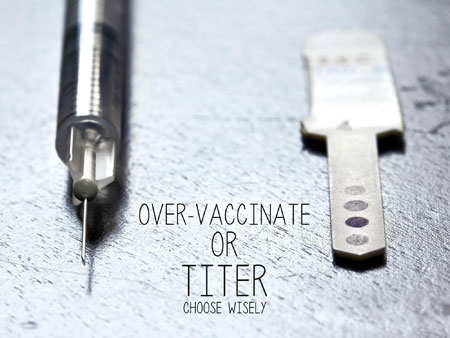Pet Gazette & PDSA Advice

Potentially Fatal Advice: I receive a publication through my email on a regular basis. It is called Pet Gazette. You would think that with a name like that they would have pet’s health and wellbeing as a first priority.
They are still posting that same dangerous information today the 5th July 2017.
Almost a month later you can see that the incorrect advice is still there for all to see
As one of the leading writers and researchers regarding vaccinations, I have written a number of articles about vaccination dangers, I am first on Google with this term (1) Annual Dog Vaccinations Dangers.
Not only is the advice still there, but they also threatened me with prosecution, I have news for them, you cannot sue people who tell the truth.
Let me say for the record that Sara Cork who is the editor, does not appear to understand just how dangerous the Pet Gazette’s and PDSAs Advice is regarding their article.
I also called the PDSA and was promised that a Vet would phone me back. That was 12 days ago, they never called me back. I have been concerned on a number of occasions regarding scare stories from the PDSA. Please do not get me wrong they do an excellent job for 99% of the time. This wasn’t one of them.
Having said that, whoever writes their press releases needs to understand current ruling with regard to core vaccinations, which have been in place since 2010. It is on their own website as every 3 years.
In areas that relate to pets health and wellbeing, they cannot claim a lack of prior knowledge. All recommendations should adhere to current vaccine policy guidelines. These are known diseases that can be triggered by vaccines these are just a few of them:
Autoimmune haemolytic anaemia, leukaemia, thyroid disease, Addison’s disease, diabetes, cancers, lymphoma, arthritis, allergies and anaphylactic shock.
I am disgusted and surprised that they have not acted to put this right. To over vaccinate, or to demand unnecessary vaccinations, is to put that animal at risk; it does not impart any benefit but could cause serious reactions, even death. This is in direct contravention of the Animal Welfare Act. This snippet is from a letter I received from the BVA 18 months ago
“The duration of immunity (DOI) for each medicine or product is different and veterinary surgeons must keep up to date with this information.” In 2010 the Veterinary Medicines Directorate (VMD) wrote a letter to the two major veterinary publications Veterinary Record and Veterinary Times, explaining that recent trends in data mean that the DOIs for a number of common vaccinations (canine distemper, parvovirus, and adenovirus) are now three to four years. This is information that veterinary surgeons will be aware of and will be following.”
If that is the case, the Vets that are administering annual core vaccinations are clearly not following their professional body or the vaccine company’s guidelines. What would happen if a GP did that?
Vaccination Schedules: When an animal is successfully vaccinated against certain diseases (distemper, parvo, and adenovirus in dogs, and becomes immunised, they receive what is called sterile immunity. Sterile immunity lasts a minimum of 7 to 9 years, up to a maximum of lifetime immunity, as measured by titer tests.This means the pet cannot become infected.
Since the diseases of distemper, parvo, hepatitis (adenovirus), are everywhere, the risk of exposure is constant and has nothing to do with local outbreaks. I would love to know how the powers that be came up with the 3 to 4 years duration between vaccinations, as I cannot find any scientific evidence to point to this assumption?

Titer Testing: Titer testing ( a blood test that shows antibodies and immunity) should always be the first choice, as immunity lasts for years or life.
Re-vaccination at any interval puts your dog at risk, but will provide no benefit if already immune.
To do so is in contravention of the Animal Welfare Act – simply because this act aims to reduce suffering. It is peer reviewed and documented that over-vaccination can cause serious health problems.
Unfortunately, the majority of conventional veterinarians prefer to simply re-vaccinate every year, or every 3 years, without establishing whether the animal is already immune to the disease being vaccinated against. And all that takes is a simple blood test. Therefore always Titer first.
Let me point out I am not against vaccinations and the immunity that it creates. What I am violently opposed to is taking pet owners as cash cows and fools, at the same time putting our much-loved pets at risk from totally unnecessary vaccinations.
It may be worth reading the Kennel Clubs recent survey that shows that our pets, in this case, dogs, are dying 11% sooner than they did 10 years ago. I wrote an article to explain why? One of the culprits was over-vaccination. (3) Why Are Our Dogs Dying so Young?
© Stan Rawlinson June 2017
















Comments (14)
Vaccines
From a position of ignorance, do puppies have a natural, built-in immunity to any of these conditions? Can/should a Titer test be carried out before vaccination?
How does this affect travel abroad?
Do Pups have built in immunity?
Puppies naturally have an immunity for a while. Depending on whether the mother has been vaccinated at some time. Mother Nature has devised a method to provide newborns with protection from disease-causing organisms. This method is called passive immunity. Immunity is “passed” to the puppy through the antibody loaded, first milk produced by the mother. This special milk is called colostrum.
Newborn puppies, through some process that we do not fully understand, are able to absorb the large maternal antibodies into their blood system through their intestinal wall unchanged. The absorption of these large protein molecules is one of the peculiarities of newborns. As the puppy ages, his digestive system begins to hydrolyze protein molecules. This is a process in which a molecule of water is added to proteins, breaking them into smaller sections. This is important because if the maternal antibodies are hydrolyzed, they lose their ability to destroy disease causing viruses and bacteria.
Usually, toward the end of the puppy’s first 18 hours of life (may be as few as 12 hours) he loses the ability to absorb these antibodies and they are hydrolyzed. Therefore, even if the mother continued to produce colostral antibodies, they would be destroyed and not provide any protection to the puppy.
It is important that we now clarify one often-misunderstood point. As stated, colostrum with its antibody protection is only present in the first 24 hours of milk flow and newborns can only gain colostral immunity if they nurse during that time frame, and they are less than one day old. After that, it makes no difference how much or how little they nurse; they will not absorb any more antibodies.
I hope that made sense. The protection from that initial colostrum does wane and it is then that the puppy needs immunisation to create its own antibodies which normally last for the lifetime of the puppy.
Annual vaccinations
Thank you so much for raising this subject once again. We have a rescue Staffy 3yrs old and have been following your articles on vaccinations. Due to the health dangers annual vaccinations can cause we changed our Vetinary provider by ringing around until we found one who does not recommend annual jabs. We were concerned that our pet insurance would be affected if we did not find a Vetinary practice that clearly states 3yearly core vaccinations. We will now have our dog blood tested before we agree to any further jabs. We have been spreading the word to friends in the hope they will then question this “cash cow” attitude that sadly a lot of Vetinary practitioners insist on. We have found this practice is prevelent in large chain orginisations, though some smaller practices do need to listen as well
I totally agree with you.
I totally agree with you. These Vets are putting our pets at risk on the god of profit. They have to swear an oath when becoming a Vet.
“Inasmuch as the privilege of membership of the Royal College of Veterinary Surgeons is about to be conferred upon me, I PROMISE AND SOLEMNLY DECLARE that I will abide in all due loyalty to the Royal College of Veterinary Surgeons and will do all in my power to maintain and promote its interests. I PROMISE ABOVE ALL that I will pursue the work of my profession with uprightness of conduct and that my constant endeavour will be to ensure the welfare of animals committed to my care”
In short, that means first do no harm. What a pity that many do not fulfil that solemn promise. There are ethical vets out ther however you have to search for them.
Vaccinations, of course
My new puppy had the Lepto-2 course which started with his breeder, it took almost an entire day ringing round veterinary surgeons if they did the Lepto-2; all but one I rang only offered Lepto-4 (one suggested I buy an entire box of Lepto-2 if I ‘really wanted to have that one’) and all those wanted to start the course again.
The vet I found that did Lepto-2 said that she would happily titre test in future IF he had his first annual booster (due this month) but didn’t seem to want to entertain him having a blood test, then the jab if necessary.
How do I find a vet who will titre test FIRST? Is there a list of aware veterinary practioners?
My own Vet is what is called Ethical
My own Vet is what is called an ethical Vet, I had a litter of puppies recently and I insisted that Lepto 4 was not used. So he vaccinated them all the Lepto 2 There was no argument he knows my feelings and beliefs regarding vaccines. The only reason I had Lepto 2 done was puppies immune systems are susceptible to diseases. However, that will be the first and last time I vaccinate for Lepto of any description until they find a one that is worth the risk against the rare occurrence of this disease being fatal.
Lepto like Flu vaccines has a low success rate because it mutates differently in different parts of the country The chances of having the strain of Lepto regarding the area you live in is not very high. For instance the Flu jab in 2015 for only 2% efficient as it did not cover the strain of the other 98%.
I, too, agree
Thanks for this article Stan. I’ve been researching the dangers of over-vaccination for a couple of years, it was something I read online that started me off; it could have been one of your articles. I’ve had to be quite forceful with my vet about not vaccinating my dog yearly & I’m not really an argumentative person so it was a bit embarrassing. They’ve given up trying to bully me now & that is thanks to being able to quote clear, concise facts like those that your article gives me. Like one of the posters above I’m trying to spread the word & I’ve had a few successes. The biggest argument I come up against is people who have to send their dogs to boarding kennels as these won’t accept dogs that are not vaccinated. I would never put my dog in kennels, but understand that some folk have to & these people are stuck between a rock & a hard place. How do we spread the word to the boarding kennels? Is it an insurance issue? Once again many thanks for all the interesting articles you write, I for one as a concerned dog owner, really appreciate your back up.
Boarding Kennels
I think you may find this helpful. This is an article i wrote a couple of years ago and update regularly https://www.doglistener.co.uk/annual-dog-vaccination-dangers In there is this information
Kennels, Catteries, and Vaccinations
I have personally fought long and hard for local kennels and catteries to adhere to the latest scientific evidence on the dangers of over vaccinations.
There is now guidance with regard what is required by kennels and catteries in relation to up to date vaccinations. see the link to Kennels and Catteries at the bottom of this article.
Kennels and Catteries may find themselves committing and offence in accordance with the Animal Welfare Act 2006. Some of the regulations may lead to placing boarding establishments in contravention of those acts. It is an offence under the Act to cause harm or suffering, which may arise due to unnecessary over-vaccination as promoted in the MLCs.
Kennels and Catteries
Vaccinations and insurance
I thought others might be interested to know that Tesco Pet insurance seems to offer very similar cover to the top range pet plan insurance and specifically mentions that if you choose not to vaccinate regularly against the common dog diseases they will exclude those from your insurance, but will still cover anything else. Whereas Pet Plan and many other insurers require you to vaccinate annually, and you lose all your insurance cover if you don’t do that. Tesco is also about 1/5 of the price of Pet Plan but offers similar cover, including continuing treatment for things which have been diagnosed in previous years – I mean that even if you have claimed up to the maximum in a year for a particular disease or problem, that will be covered the following year, as long as you renew the policy.
I will be contacting Pet Plan
I will be contacting Pet Plan and a few other insurance companies and will put in here the findings thanks for raising this point..
Pet plan and Titre test
Hi I ve just come off the phone with Petplan regarding their policy and titre test as titre test is not even mentioned in their terms and conditions. Before i took the policy with them last week the operator said after speaking to his manager, that if the vet advises that since titre test results are fine and he says the dog doesnt need the yearly vaccinations done hen Petplan will still cover it. I requested that to be in writing and the guy said yes we can do the policy and then email that for u. I never received that email!!! I called back and they said they will within 48 hours. Then since i still didnt receive it i called up today for the operator telling me that titre test results are not covered by the policy and can not accept it! Im really upset by this and dont really know what insurance would cover the titre tests results. I belive it is outrageous to force to over vaccinate so your covered by the policy. Is there anything we could do?
Did you get a reply from Petplan Mr. Stan Rawlinson?
Kind regards
Sofia B.
Pet Plan
I have contacted Pet Plan today and ask for confirmation, They do accept Titer/Titre tests but only if the Vet deems it necessary and they are still insisting on annual dog vaccinations or these tests annually. I will be writing to their underwriting team at Allianz for clarification on why they are ignoring The Vaccine companies guidelines and the guidelines of the BMA and WSAVA which since 2010 has stipulated every three to four years for core vaccines.
Vaccination dangers
My dog was vaccinated twice as a puppy ( i even felt bad about doing that)
Thank you for assuring me with your in depth research into medical journals, veterinary board statements, ethical vet warnings and statistics.
Also your personal advice as a respected, professional dog trainer is very valuable.
I will not be sending my beloved dog to have any more harmful and unneccessary vaccinations.
Also; i love all of the dog food at your store. Natural and healthy. Very grateful you’re in the area.
.
.
Comments are closed.